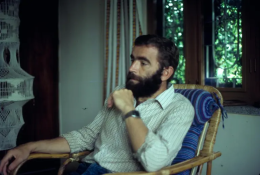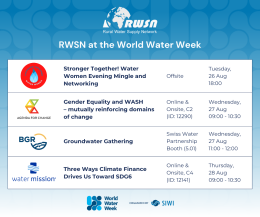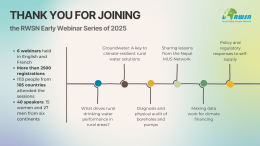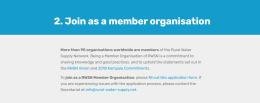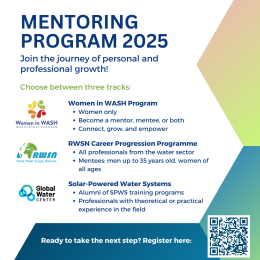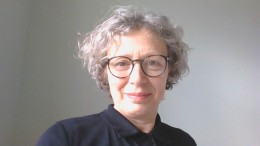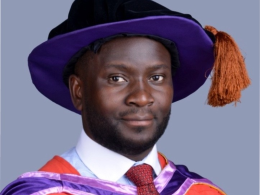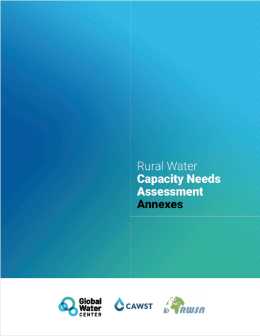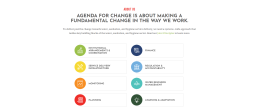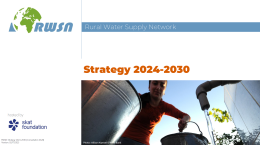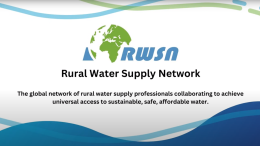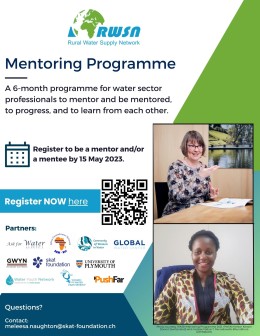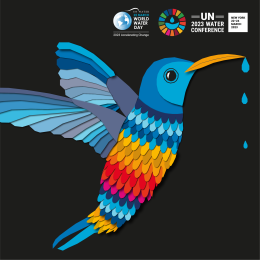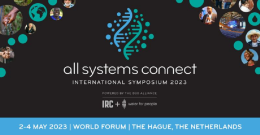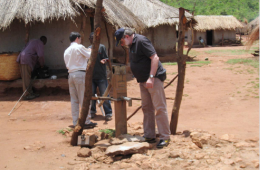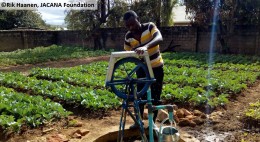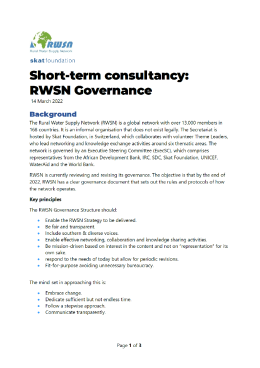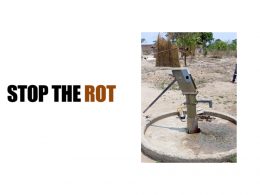Rural Water Supply Network
News
Total Results: 20 • Page 1 of 5
Remembering Erich Baumann, founder of RWSN (1944-2025)
Erich Bauman, the founder of RWSN, passed away in Ireland at the age of 81 after a brief illness. He was an imaginative and gifted water engineer and development practitioner with many years of hands-on field experience, mainly in Asia and Africa.
12.12.2025
A pragmatic, out-of-the-box thinker and leading authority on the design, manufacture, and maintenance of handpumps in low-income countries, Erich was a forceful advocate for the community ownership and management of small-scale water schemes and an indefatigable trainer of government engineers and village-level operatives.
Erich was born and grew up in Switzerland. After graduating as a mechanical engineer, he began his career designing tractors, but the 1970s were a bad time for the industry and many factories, including his, closed. So, in 1979, he moved to Bangladesh where he began work at the Mirpur Agricultural Workshop and Training School (MAWTS) where his focus moved from tractors to expanding the manufacturing capacity of factories to produce and sell the simple rower-pump, which was ideal for low-cost irrigation. It was through this that he met Ken Gibbs (UNICEF) and Tim Journey (World Bank) who were working on improvements to direct-action handpumps for domestic water supply.
In 1984, Erich turned down a job at the World Bank to return to Switzerland and join SKAT, which was then an association affiliated with the University of St. Gallen. He rose to become Managing Director and navigated the organisation through the tricky transition of becoming an independent consulting company, SKAT Consulting Ltd, in 1997 and establishing Skat Foundation in 2002, before handing over the reins to Jürg Christen. His attention to detail and quality was applied to getting ISO 9000 accreditation in quality management within the organisation.
RWSN Secretariat at the World Water Week 2025
19.08.2025
We are excited to share the list of sessions and events the RWSN Secretariat co-organises and speaks at, as well as some interesting sessions below.
Thank you for joining the RWSN Early 2025 Webinar Series!
01.07.2025
Over the past months, we have held six webinars in English and French, welcoming over 1,100 participants from 105 countries and engaging with 40 speakers from six continents. To us, this shows the global commitment to advancing rural water supply.
New application process for becoming an RWSN Member Organisation
26.05.2025
We have updated the application process for becoming an RWSN Member Organisation! Now, all you need to do is fill out the special application form, which creates an easier and more streamlined process.
In addition, there is a new three-level categorization system within our member organisations. Contact us at info@rural-water-supply.net if you would like to upgrade your membership.
For more information and a link to the registration form, click below.
RWSN Mentoring Programme
Apply today!
26.03.2025
Registration to this year’s mentorship program is now open! This free program is open to all RWSN members and water professionals and offers an incredible opportunity for knowledge-sharing, career growth, and networking in the water sector. Program is held in English, French, and Spanish.
This year, we’re offering three special mentoring tracks:
• Women in WASH Program - a women-only mentoring space managed by Agenda for Change, designed to foster personal and professional development.
• RWSN Career Progression Programme - open to young and experienced professionals from the water sector looking to advance their careers, improve leadership skills, and share knowledge.
• Solar-Powered Water Systems Track – a partnership with the Global Water Center for alumni of SPWS training programs and professionals in the field.
Who can apply?
Mentees: Young professionals (men under 35), women of all ages, and alumni of GWC Solar-Powered Water Systems courses. No experience is required - students are welcome!
Mentors: Professionals with at least 5 years of experience in the water sector. We are looking for a range of mentors with different levels of experience and a variety of skills, so don’t hesitate to apply even if you feel that you may not be ‘senior’ enough.
Spots are limited to 300 participants on a first-come, first-served basis - so don’t wait! Apply now to secure your place.
Celebrating the life of Louisa Gosling
21.10.2024
It is with deep sadness that we inform our members and partners of the passing of Louisa Gosling, former Chair of the RWSN Executive Committee (2019-2022), former Theme Leader of the Leave No One Behind theme (2011- 2021), and a great champion of Human Rights to water and sanitation.
Louisa was an inspiration for many, including the younger generation of WASH professionals at the early stages of their career. For those who were fortunate enough to have had the opportunity to work with her in person, Louisa always taught them something new each time, and was never afraid to challenge - always politely - in a way that got people thinking more deeply, more widely and profoundly... Louisa was exceptionally engaged with and a constant source of support for professionals as the field of equity and inclusion evolved and new topics emerged. Her open-minded nature was one of the critical catalysts of the fast-paced progression of efforts to leave no one behind in the WASH sector globally, which clearly shone through her work for RWSN, whether it be through leading webinars, or her passionate involvement in RWSN online discussions. Louisa had a constant presence in the working lives of inclusion experts. She actively made efforts to ensure that the younger generation of professionals had a voice, striving to constantly give them a platform, whether it be through actively involving them as part of conference workshops to encouraging them to write about their work far and wide on platforms ranging from the SuSaNA forum through to WaterAid’s WASH Matters blog.
Her first-hand experience on the ground working with marginalised groups over the years shaped her leadership of the RWSN Leave no one behind theme, leaving an unparalleled legacy for theme leaders who would follow in her footsteps in years to follow.
You can follow Louisa’s funeral and memorial, and share your condolences with her family using the link below.
Welcoming the new RWSN Chair: Dr James Origa, Ph.D, World Bank
Video Announcement at World Water Week 2024
14.10.2024
We are delighted to welcome the new RWSN Chair of the Executive Committee, James Origa, Ph.D.Listen in as James shares the motivation behind his work in the water sector and his vision for supporting the network in this capacity for the next three years.
Dr Origa is an Engineer and Public Policy Expert with extensive experience in Water Development, public policy analysis, and Humanitarian assistance.
Since 2009, he has worked from local to global level in the most rewarding career towards delivering Water and Sanitation services to those who need it most across Africa - from Kenya, Somalia, DR Congo, Tanzania, and Ivory Coast. Over this period, he has built core skills and leadership capabilities in developing strategic policy priorities, leading research, supplying timely and actionable policy advice, and coordinating policy initiatives and public services interventions.
He has served with various organisations including World Renew, Oxfam, Mercycorps, United Nations Development Programme (UNDP), and Private Consulting firms. He is currently a Water Supply and Sanitation Specialist at The World Bank.
We thank our former Chair, Tommy Ka Kit Ngai from WaterAid, for the immense value he brought to the Network and wish him all the best from the bottom of our hearts.
The RWSN Executive Committee members, Theme Leaders, and Secretariat look forward to taking this next step and continuing working towards our vision of a world in which all people enjoy safely managed water services that are resilient and sustainable.
New report: Rural Water Capacity Needs Assessment
Report on the Rural Water Capacity Needs Assessment and Annexes
10.10.2024
Global Water Center (GWC), Centre for Affordable Water and Sanitation Technology (CAWST), and Rural Water Supply Network (RWSN) are proud to announce the release of the "Rural Water Capacity Needs Assessment" report. This comprehensive report, based on a thorough analysis of 280 responses, sheds light on the critical gaps and challenges in the rural water sector.
RWSN forms alliance with Agenda for Change
RWSN commits to strengthening WASH Systems
06.02.2024
RWSN has joined Agenda for Change as a Strategic Ally, and they have joined RWSN as a partner network. Established in May 2015, Agenda for Change is a collaboration of like-minded organizations (“Members”) that have adopted a set of common principles and approaches.
Together we will collaborate on WASH systems strengthening, particularly around mentoring, life-long learning and supporting the role of women as professionals and decision-makers. We will also work collectively to advocate for, and support national and local governments in, strengthening the water, sanitation, and hygiene (WASH) systems required to deliver universal, sustained access as outlined under Sustainable Development Goal 6.
Volunteer opportunity: RWSN co-Theme Leader – Sustainable Services
19.01.2024
The Rural Water Supply Network (RWSN) is THE global network for rural water professionals run by rural water professionals - do you want to get involved?
We are looking for dynamic individuals and organisations to strengthen our collaborative work as we push for universal access to safely managed drinking water by 2030. There are now openings for a Co-Lead for the Sustainable Services theme.
These positions are unpaid. Being an RWSN Theme Leader gives you, and your organisation, an opportunity to bring your expertise to a global audience and to be part of enthusiastic, diverse team from all over the world.
Have your say in the future of rural water supply (deadline 30 November)
Donnez votre avis sur l'avenir de l'eau en milieu rural (date limite : 30 novembre)
02.11.2023
Many RWSN members have contributed to and shared their thoughts during the process of developing the new strategy. We would like to thank you for your inputs, and take a moment to share the first draft of the new strategy for the network for 2024-2030. We are opening a consultation phase of 4 weeks, during which all RWSN members and partners may submit their comments on the draft strategy through an online form, or by social media or by email to info@rural-water-supply.net or the Secretariat Director, Sean Furey. Follow the links below.
We look forward to your feedback on how to make RWSN work for your needs for the next 6 years.
De nombreux membres du RWSN ont contribué à l'élaboration de la nouvelle stratégie et ont partagé leurs réflexions à ce sujet. Nous aimerions vous remercier pour vos contributions et prendre un moment pour partager la première ébauche de la nouvelle stratégie du réseau pour 2024-2030. Nous ouvrons une phase de consultation de 4 semaines, au cours de laquelle tous les membres et partenaires du RWSN peuvent soumettre leurs commentaires sur le projet de stratégie par le biais d'un formulaire en ligne, ou par les médias sociaux ou par courriel à info@rural-water-supply.net ou au directeur du secrétariat, Sean Furey. Suivez les liens ci-dessous.
#CareerChats
Tips and experiences of careers in water and sanitation
12.09.2023
We have just launched a new weekly video series called Career Chats, which features interviews with some of our members. These interviews showcase the diversity of RWSN's membership and offer practical tips and guidance tailored to young people in the water sector. Our first guest was Neil Dhot, Executive Director of Aquafed; he shared about the collaboration program Valuing water initiative, and about his career pathway.
Next, we have the interview with Taryn Meyers, Director of Global WASH services at the Centre for Affordable Water and Sanitation Technology (CAWST). She shared about her career pathway and advised women in the water sector in particular. A new interview will be published each week at https://www.youtube.com/@rural-water-supply-network
Would you like to mentor someone, or be mentored? RWSN mentoring programme announcement (EN/ FR/ SP)
Register to be a mentor and/or a mentee by 15 May 2023 / Inscrivez-vous devenir mentor et/ou mentoré avant le 15 mai 2023.
18.04.2023
In 2023, for the fourth year, RWSN is running its mentoring programme for the water sector. Hundreds of water professionals have already participated in the RWSN mentoring programme in previous years. This year, we will be using the PushFar online platform for mentors and mentees to be able to find each other directly.
∙ How does the RWSN Mentoring Programme work? Our mentoring programme lasts 6 months and connects a mentor and a mentee in the water sector. Mentors and mentees find each other via the PushFar platform, and then maintain communication directly through PushFar, Skype, WhatsApp, email, messages etc, as they prefer. Our guidance document (in English, French or Spanish) can give you an idea of the timeline and structure of the programme.
∙ What are the benefits of the RWSN Mentoring Programme? To get an idea of the benefits of participating in the RWSN Mentoring Programme, you can watch this video and read the blogs where some of our previous RWSN mentees and mentors share their experience. In case you still need convincing, our partner PushFar has some really interesting statistics on the benefits of mentoring for mentees AND mentors here.
∙ Who is the RWSN Mentoring Programme for? The 2023 RWSN Mentoring programme is open to all RWSN members and free of charge. If you are not yet a RWSN member, you can join RWSN here.
Mentees: All young professionals under the age of 35 and women of all ages in the water sector are eligible to be mentees. In addition, alumni of selected RWSN courses (on solar-powered water systems, groundwater resources management, and professional drilling management) will also be eligible and will be included by invitation only. There is no minimum level of experience required. Students are welcome to participate.
Mentors: There is no age requirement for mentors (senior professionals), but they should have a minimum of 5 years of professional experience in the water sector. We are looking for a range of mentors with different levels of experience and a variety of skills, so don’t hesitate to apply even if you feel that you may not be ‘senior’ enough.
We strongly encourage women to sign up both as mentors and mentees, as they are currently under-represented in our membership and in the sector more broadly – and we would like this to change!
Interested and want to join as a mentor, mentee, or both? Read our guidance document first (in English, French or Spanish) to check that you understand your role and are eligible, and then sign up through our online platform. You may find these guidelines helpful to navigate the online platform. The number of participants of the RWSN Mentoring Programme is capped and participants will be admitted on a first-come, first-served basis – so sign up early to avoid disappointment!
WORLD WATER DAY 2023: ACCELERATING CHANGE
JOURNÉE MONDIALE DE L’EAU – ACCÉLERER LE CHANGEMENT
13.01.2023
World Water Day 2023 is about accelerating change to solve the water and sanitation crisis.
Dysfunction throughout the water cycle is undermining progress on all major global issues, from health to hunger, gender equality to jobs, education to industry, disasters to peace.
Back in 2015, the world committed to Sustainable Development Goal (SDG) 6 as part of the 2030 Agenda – the promise that everyone would have safely managed water and sanitation by 2030.
Right now, we are seriously off-track. Billions of people and countless schools, businesses, healthcare centres, farms and factories are being held back because their human rights to water and sanitation have not yet been fulfilled.
The Call for contributions for #AllSystemsConnect2023 is now open
Partagez votre expérience, votre apprentissage et votre sagesse
22.09.2022
Co-design the programme with us by developing sessions and/or inputting into the content as a speaker or facilitator.
Help spark the thinking and action that will mobilise the power of water and sanitation to act as a gateway to achieving the SDGs. Submit your contribution by 15 October 2022.
Si nous voulons progresser plus rapidement et avec plus d'impact vers tous nos objectifs, nous devons regarder au-delà de nos propres secteurs et disciplines. C'est pourquoi nous vous invitons à organiser une session à l'ASC23 ou à y participer en tant que contributeur pour susciter la réflexion et l'action qui mobiliseront le pouvoir de l'eau et de l'assainissement pour agir comme une passerelle vers la réalisation des ODD.
Que recherchons-nous ?
Propositions explorant les corrélations entre l'eau et l'assainissement avec la santé, le climat, le développement économique, l'éducation et la justice sociale, ainsi que des contributions individuelles qui seront combinées en sessions pour compiler le programme de l'ASC23.
From Tractors to the Tara pump
30 Years of HTN/RWSN
21.09.2022
This year we are celebrating 30 years since the Rural Water Supply Network was formally founded. From very technical beginnings as a group of (mostly male) experts – the Handpump Technology Network- we have evolved to be a diverse and vibrant network of over 13,000 people and 100 organisations working on a wide range of topics. Along the way, we have earned a reputation for impartiality, and become a global convener in the rural water sector.
RWSN would not be what it is today without the contributions and tireless efforts of many our members, organisations and people. As part of RWSN’s 30th anniversary celebration, we are running a blog series on rwsn.blog, inviting our friends and experts in the sector to share their thoughts and experiences in the rural water sector.
This is a guest blog by RWSN co-founder Erich Baumann, based in Ireland.
Groundwater and self-supply: more to it than meets the eye
Les eaux souterraines et l'auto-approvisionnement : plus qu'il n'y paraît
17.03.2022
“Groundwater may be out of sight, but it must not be out of mind.” This year’s tag line of the World Water Day points to the fact that despite its size and importance, groundwater is often overlooked and “out of our minds”. Right below our feet there are vast amounts of water, but most of the time we do not think about them. As society we tend to overlook it as a potential source of water for different purposes, and we also forget how fragile it is to be contaminated.
In low-income settings, the use groundwater is often limited by lack of resources (technology for drilling, energy for pumping, and supply chains to keep these systems operational). Nevertheless, several hundred million people across the globe have been providing water for themselves (“self-supply”), mostly from groundwater:
- In South Asia, Southeast Asia, and the Pacific, more than 760 million — or 31% of the population —rely on self-supply for their drinking water.
- In Sub-Saharan Africa, some 46 million rural people and 125 million urban people rely on private groundwater sources, equivalent to 7% and 33% of the rural and urban population, respectively.
These people tapped into groundwater sources by their own means, usually without support by governments, donors, NGOs or development banks. For more than a billion people worldwide self-supply is the best (and often the only) option to access water – and with coordinated efforts and stronger support structures, many more people may benefit.
On the occasion of World Water Day 2022, Skat Foundation and a group of like-minded organizations (WaterAid, SIWI, IRC, Ask-for-Water, University of Sydney) jointly developed a fact sheet on groundwater and self-supply, and how the two topics are related. We invite you to read the document, share it widely, and – most importantly – act on it. Here is the list of actions we are proposing:
• WASH professionals: Recognize the role of individual households in upgrading WASH service levels, support the collection of evidence on the multiple impact of self-supply, support initiatives of market intelligence, capacity building, exchange, and learning.
• Government entities: Recognize the role and importance of self-supply (e.g.,
include self-supply in monitoring efforts, recognize it in policies and standards),
build expertise in institutions, establish an enabling environment for local private
sector actors to thrive, and build capacities.
• Academia: Include technologies and approaches adequate for individual household
supply (or small groups) in research projects, include self-supply as an approach,
investigate enabling and hindering factors for WASH entrepreneurs to establish a
business and thrive, look into the multiple benefits generated by self-supply.
• Funding agencies: Include self-supply components in projects, focusing on kickstarting
market-based mechanisms, promotion, capacity building, market
intelligence, research and evaluations.
• Implementing agencies (NGOs, UN agencies, etc.): Integrate self-supply
components in projects of WASH, rural development, market development and
livelihood improvement; pilot and showcase technologies that can be taken up by
individual households and small groups.
For more information, please check out the fact sheet on groundwater and self-supply or the RWSN website on self-supply.
Short-term consultancy: RWSN Governance
14.03.2022
The Rural Water Supply Network (RWSN) is a global network with over 13,000 members in 168 countries. It is an informal organisation that does not exist legally. The Secretariat is hosted by Skat Foundation, in Switzerland, which collaborates with volunteer Theme Leaders, who lead networking and knowledge exchange activities around six thematic areas. The network is governed by an Executive Steering Committee (ExecSC), which comprises representatives from the African Development Bank, IRC, SDC, Skat Foundation, UNICEF, WaterAid and the World Bank.
RWSN is currently reviewing and revising its governance. The objective is that by the end of 2022, RWSN has a clear governance document that sets out the rules and protocols of how the network operates.
We are looking for a consultant or consultants to undertake a short assignment to find answers to the following questions:
1. How can Regional RWSN “chapters” or “hubs” be incorporated into RWSN’s overall global governance?
2. How can the structure and processes of the RWSN Executive Steering Committee be more reflective of the key principles?
Please follow the link below to download the full call
RWSN updates February 2022 and upcoming events
Mises à jour du RWSN et événements à venir // Actualizaciones de la RWSN y próximos eventos
16.02.2022
Dear RWSN members [en français ci-dessous, en español abajo],
We hope you all had a great start to 2022. The year is already going in full swing, and we would like to share some RWSN updates and upcoming events with you.
My name is Tommy Ka Kit Ngai and I am the Head of Water, Sanitation and Hygiene at WaterAid UK. At the RWSN Executive Steering Committee on 27 January, I was honoured to accept the role of RWSN Chair for the remainder of WaterAid’s tenure. I have been a RWSN member for about 10 years and have always been encouraged by the unwavering commitment of fellow RWSN members to collaborate and support each other in bringing sustainable and reliable water supplies to all rural people. Collectively, we have a world-leading, immense pool of knowledge and experience in rural WASH. I am thrilled to be here. I look forward to learning from and working alongside with all of you.
Thank you, Louisa Gosling and SDC
• It is with much sadness that Louisa Gosling stepped down as Chair of RWSN due to health issues as of December 2021. We thank her so much for her great leadership and passion for the network, and in particular, she worked tirelessly with the Leave no One Behind theme and has been a great advocate of RWSN over the last ten years. We wish her strength and good health in her next chapter.
• The Swiss Agency for Development and Cooperation (SDC) has supported this network since the beginning when we were founded as the Handpump Technology Network in 1992. Thanks to their steadfast partnership, RWSN has grown from a mailing list of a few dozen engineers to a diverse, global network of nearly 14,000 individuals and more than a hundred organisations in 167 countries. The RWSN Strategy, Roadmap and ongoing governance review are setting the network on an exciting new path and we will share more details in future updates. SDC’s strategic orientation is shifting and with it our modality of collaboration. We thank the SDC Global Programme Water for providing exceptional support over the last 30 years, and to Dr Daniel Maselli in particular who has been a great ally and guide over the last few years. Switzerland remains committed to improving global water security and we look forward to continuing our partnership in new ways.
Welcome to Ndeye Awa Diagne, Dr. Amita Bhakta, WHO and USAID - and “Data for Action”
• Ms Ndeye Awa Diagne (“Awa”) has joined the RWSN executive committee. Awa is a Water and Sanitation Specialist at the World Bank in Washington DC, with 10 years experience, including 6 with the World Bank and 2 at the Société Nationale des Eaux du Sénégal. Her current responsibilities include managing the Bank’s internal community of practice on rural WASH. Linkedin
• New Leave No One Behind (LNOB) theme co-lead Dr. Amita Bhakta. Amita is a Freelance Consultant in Water, Sanitation and Hygiene (WASH); Website: Amita Bhakta – Hidden WASH; LinkedIn
• Welcome to our new RWSN project partners, USAID, who are funding REAL-Water, a five year research programme on rural water headed by Aquaya Institute with KNUST Ghana, ATREE, Safe Water Network, Aguaconsult and Water Mission.
• We are delighted to be collaborating with WHO as they prepare to finalise and publish “Guidelines For Small Drinking-Water Supplies: Policy Guidance And Supporting Tools”. Look out for more updates later in the year!
• Finally, the RWSN Theme “Monitoring and Mapping” will be changing its name to “Data for Action”; the change will be effective over the course of this year.
Upcoming events
• On 22nd March we celebrate World Water Day. This year the theme is “Groundwater: making the invisible, visible”. You can take part in the celebration and raise awareness on groundwater by checking the website: https://www.worldwaterday.org/. There are many materials available for download to share with your community and networks, raising awareness on groundwater. RWSN also has a wealth of resources related to Groundwater, see below.
• 9th World Water Forum, Dakar - RWSN is delighted to be hosting French/English Session 2A4 on Rural Water Supply Management Models in Room 3 at 9am on 22 March. For those coming to the Dakar, we look forward to welcoming you to this great session, with interesting case studies from Morocco, Madagascar, Senegal, Ghana and Uptime and panellists including the Director General of Water from the Government of Spain. https://www.worldwaterforum.org/
RWSN resources related to Groundwater
• Does your organisation drill boreholes, or perhaps fund others to drill? If so, check out the wealth of materials on borehole drilling on the RWSN website: https://tinyurl.com/waterdrilling
• Do you want a quick, and easy introduction to borehole siting, supervision, procurement and drilling itself? If so, then watch these very short animated films (available in English and French): https://vimeo.com/channels/drilling
• Want to know about how to unlock the potential of groundwater in Africa, then check out this short film: https://vimeo.com/582160363
• Are you looking for ways to support access to groundwater at a low cost? Then you should find out if manual drilling is an option? This is a good place to start: https://www.rural-water-supply.net/en/sustainable-groundwater-management/manual-drilling
• Want to learn about professional drilling from other RWSN members and partners? There is an archive of presentations and webinars available here: https://vimeo.com/channels/1432819
• Do you have questions or concerns about using solar-powered water systems to pump groundwater? This is a good place to start: https://www.rural-water-supply.net/en/sustainable-groundwater-management/solar
New Groundwater Publications from RWSN and in collaboration with others
Dr Kerstin Danert, co-lead of Sustainable Groundwater Development Theme has been extremely busy over the last year and involved in lead and co-author roles on several key publications that will be published over the next month:
• “RWSN Groundwater Pumping Survey 2021: Summary of RWSN Member Responses.” Available in English on the RWSN website now in English and French version is forthcoming. https://rural-water-supply.net/en/resources/details/1043
• “Achievements and Lessons Learned in the Implementation of Groundwater Regulation in Zambia” / “Réalisations et enseignements tirés de la mise en oeuvre de la réglementation des eaux souterraines en Zambie” A collaborative publication with the Water Resources Management Authority of Zambia and UNICEF. Available here: https://www.rural-water-supply.net/en/resources/details/1040
• “Stop the Rot: Action research on handpump corrosion and component quality in Sub-Saharan Africa”. A three-part RWSN research report will be available from the RWSN website by the end of March.
• “Groundwater: making the invisible, visible”. Available on 22 March from https://www.unwater.org/publication_categories/world-water-development-report/
• Poverty reduction & Groundwater, International Association of Hydrogeologists, Strategic Overview series, 2022. Available soon at: https://iah.org/education/professionals/strategic-overview-series
Groundwater Solutions Initiative for Policy and Practice (GRIPP)
The GRIPP partnership, led by the International Water Management Institute (IWMI), will strengthen, expand and connect current groundwater initiatives. It will support the Global Framework for Action developed by the Groundwater Governance Project funded by the Global Environment Facilityand implemented by the Food and Agriculture Organization of the United Nations (FAO) together with UNESCO’s Intergovernmental Hydrological Programme (UNESCO-IHP), the International Association of Hydrologists and the World Bank. Building on IWMI’s three decades of research, it will embed sustainable groundwater practices at the heart of natural resource management and the SDGs.
Other groundwater resources:
• Global Groundwater Sustainability: A Call to Action
• GRIPP (2019) Groundwater: critical for sustainable development, IWMI
• UN-Water (2018) Groundwater Overview: Making the invisible visible, IGRAC
• IAH (2019) Climate Change and Groundwater, Strategic Overview Series IAH (2017) The UN-SDGs for 2030 Essential Indicators for Groundwater, Strategic Overview Series
Other events of interest for Water and Sanitation:
• 17 February - [Webinar] Water Finance Coalition meeting: Asia - 09:00-10:30 CET | Africa and Latin America - 15:00-16:30 CET [registration]
• 22-23 February - [Event] World Water-Tech Innovation Summit, London, UK
• 28-February - 03 March - [Event] Middle East and North Africa Climate Week 2022, Dubai, United Arab Emirates
• March - FAME 2022: Alternative World Water Forum (AWWF), Dakar, Senegal
• 03-05 March - [Event] UN Economic Commission for Africa (ECA): Africa Regional Forum on Sustainable Development 2022, Kigali, Rwanda
• 08-10 March - [Event] UN Economic Commission for Latin America and the Caribbean (ECLAC): Latin America and the Caribbean Regional Forum on Sustainable Development 2022, Santiago, Chile
• 10-11 March - [Virtual Event] Colorado WASH Symposium
• 15 March - [Event] Water Summit for Global Development 2022 : Catching up with urbanisation, Delft, the Netherlands [abstract deadline: 09 Jan 2022]
• 15-17 March - [Event] UN Economic and Social Commission for Western Asia (ESCWA): Arab Regional Forum on Sustainable Development 2022, Beirut, Lebanon
• 21-26 March - [Event] 9th World Water Forum: Water Security for Peace and Development, Diamniadio (Dakar), Senegal
• 22 March - [Event] World Water Day: Groundwater: making the invisible visible
• 28-31 March - [Event] UN Economic and Social Commission for Asia and the Pacific (ESCAP): Asia-Pacific Forum on Sustainable Development 2022, Bangkok, Thailand
• 30 March - 01 April - [Virtual Event] 2022 OECD Global Anti-Corruption & Integrity Forum
Best regards,
RWSN Chair and secretariat
Request for Proposals: Handpump Quality Control
Short Consultancy
06.01.2022
In January 2021, Ask for Water GmbH and Skat Foundation, under the Rural Water Supply Network (RWSN), launched a 15-month initiative called ‘Stop the Rot’. It set out to document the scale and extent of rapid handpump corrosion and the use of poor quality handpump components in sub-Saharan Africa (SSA) and bring about actions to address them. These two interlinked issues contribute to poor handpump performance, rapid handpump failure and poor water quality, all of which can ultimately lead to abandonment of the handpump sources who return to contaminated, or distance sources. These issues are recognised as problematic by some water sector practitioners in as well as a few organisations, but in general, have been poorly documented. Nearly al
The Rural Water Supply Network (RWSN) is a global network of more than 13,000 rural water professionals in 168 countries. The Secretariat is hosted by Skat Foundation, St. Gallen Switzerland and holds the international design specifications for public domain handpumps including the India Mark II, India Mark III and Afridev. Nearly all public domain handpumps in Sub-Saharan Africa are manufactured and imported from India, and therefore the India Mark II/III manufacture fall under the jurisdiction and quality standards of “Deepwell Handpumps” of the Bureau of Indian Standards (BIS).
To date, the study has prepared the following three draft reports, and is finalising a Handpump Survey of RWSN members undertaken in 2021:
1 Danert (2022) Stop the Rot Report I: Handpump Reliance, Functionality and Technical Failure, Action Research on Handpump Component Quality and Corrosion in Sub-Saharan Africa, Ask for Water GmbH, Skat Foundation and the Rural Water Supply Network
2 Other reports in the series:
3 Danert, K. (2022) Stop the Rot - Report II: Rapid Corrosion of Handpumps, Action research on handpump component quality and corrosion in sub-Saharan Africa, Ask for Water GmbH, Skat Foundation and the Rural Water Supply Network
4 Danert (2022) Stop the Rot Report III: Handpump design and quality – with Zambia case study, Action Research on Handpump Component Quality and Corrosion in Sub-Saharan Africa, Ask for Water GmbH, Skat Foundation and the Rural Water Supply Network
 Google Übersetzer
Google Übersetzer

